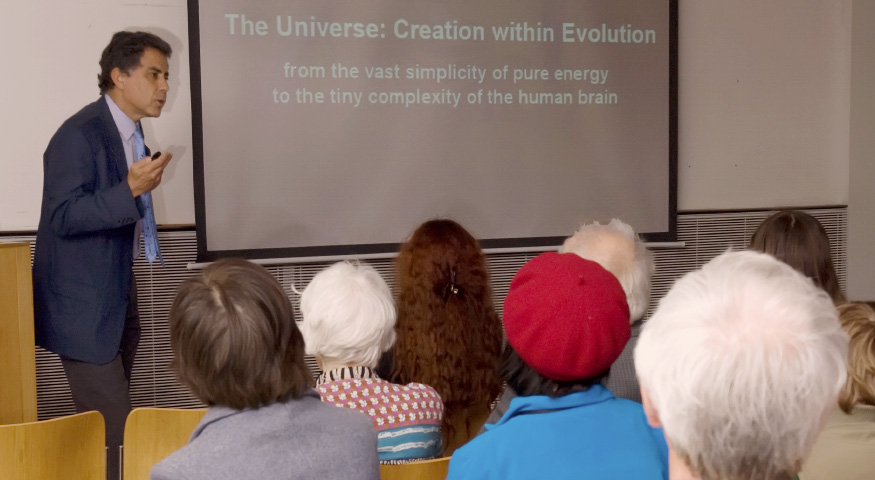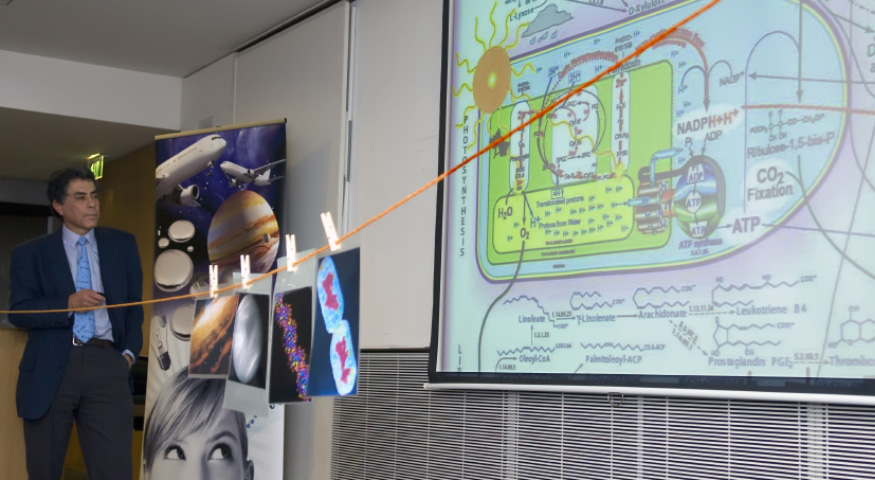Think Universe All is One
The function of education is to teach one to think intensively and to think critically. Intelligence plus character - that is the goal of true education ' - Martin Luther King Jr.
Where core science education starts at primary school:
This is a basic introduction to science education dealing with fundamental concepts in a coherent and continuous way. The context is broad and the diverse topics are linked together providing a solid base for the understanding of the natural world. At the same time, the project creates early awareness of the humanitarian and environmental challenges posed by our modern society.
Here you will find detailed descriptions of science content, teaching methodology, teacher masterclasses, public and school lectures and more.
- THINK UNIVERSE! All is One:
We bring fundamental science to young children at the time when their curiosity is at its maximum. Consequently, the target ages could be KS2 (years 5 and 6), or KS3 (year 7), according to the school preferences.
Children embark on a coherent journey of exploration and discovery towards the understanding of origins and the vast cosmic scales that bring a wide perspective to the formation of paradise Earth and the casual and recent emergence of humanity.
Our novel content and methodology are supported by comprehensive teacher masterclasses, lesson plans, teaching resources and on-line forum.
- Our teaching strategy
Departing from the traditional approach of memorising facts, our classroom delivery is based on a structured method called Question Line, where thinking is at the core of the learning process (this is part of the PhD research by one of us - Shirin Sheikh-Bahai - at the UCL IOE). Question Line establishes powerful links between the processes of questioning, thinking and learning.
- Our science content
The science content is very simple. The diverse natural sciences come together and focus on only three fundamental concepts:
- Building blocks. In simple terms, everything around us, including ourselves is the assembly of only two kinds of tiny particles that emerged at the origin of the Universe
- Cosmic timeline of Origins. The entire history of the Universe, displayed as a linear sequence of carefully selected milestones.
- Paradise for life and humanity. Our environment, extremely rare, fragile and precious, is the result of several accidental events. All life shares the same chemical structure. All humans share the same common ancestors, who migrated from Central Africa only very recently in the history of the Earth.
The entire syllabus is covered in about 12 lessons, enough for children to understand the basic principles of:
- Origins
- Particle physics
- Atomic structure
- The formation of stars and planets
- Molecules, DNA and the emergence of life
- Origin of humanity
- The environment
- Links to the science national curriculum
THINK UNIVERSE! All is One, addresses the basic principles of the Science National Curriculum, such as fostering curiosity and applying the scientific method in search of rational explanations of natural phenomena. There are curricular links to most science topics:
- plants
- animals
- rocks
- light
- forces
- habitats
- states of matter
- electricity
- evolution and inheritance
- Earth and space
There are also cross-curricular connections to: literature, mathematics, history, art, geography, religion and so forth.
Details on these links are found in every lesson plan and in the teacher masterclass.
- Our Values
THINK UNIVERSE! All is One, fosters the following universal values for the personal, social and citizenship development of children (and yes, their families and teachers too!):
- Humility. Understanding our insignificance in the cosmological context
- Pride. Despite our physical insignificance, we are proud of our ideas, creativity and capability to understand the Universe
- Humanity. This is about tolerance, compassion, empathy and active solidarity between us all
- Life and the environment. The privilege of being alive and the responsibility to cherish, preserve and enjoy our living paradise
- Wisdom. Our discoveries from exploration, curiosity and creativity help in building up our wisdom
- Self confidence. Wisdom leads to internal confidence and strength, resulting in a deep sense of freedom
“The more we understand about the environment the more we will work to preserve it ' Sir David Attenborough
Webpage last updated: 26 July 2022
 Close
Close



